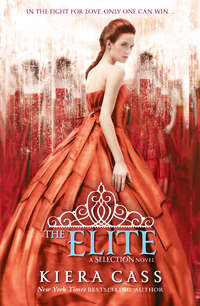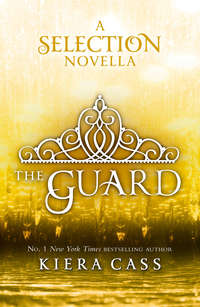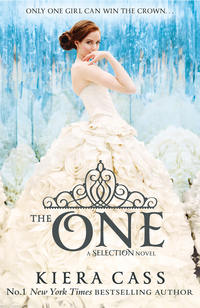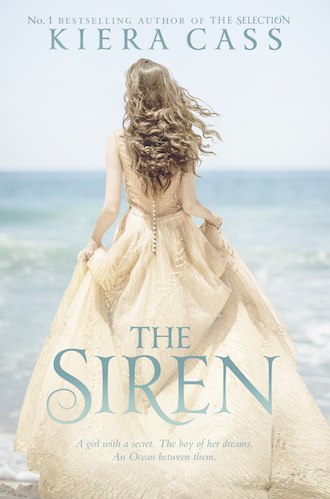
Полная версия
The Siren

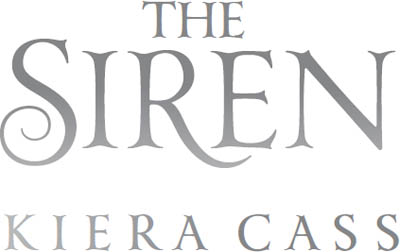

Copyright
First published in the USA by HarperTeen,
an imprint of HarperCollins Publishers Inc. in 2016
First published in paperback in Great Britain in 2016
by HarperCollins Children’s Books
an imprint of HarperCollins Publishers Ltd,
1 London Bridge Street
London SE1 9GF
www.harpercollins.co.uk
The Siren
Copyright © 2016 by Kiera Cass
Jacket art © 2015 by Gustavo Marx/Merge Left Reps, Inc.
Jacket design by Erin Fitzsimmons
Kiera Cass asserts the moral right to be identified as the author of the work.
A catalogue record for this book is available from the British Library
All rights reserved under International and Pan-American Copyright Conventions. By payment of the required fees, you have been granted the non-exclusive, non-transferable right to access and read the text of this e-book on-screen. No part of this text may be reproduced, transmitted, down-loaded, decompiled, reverse engineered, or stored in or introduced into any information storage and retrieval system, in any form or by any means, whether electronic or mechanical, now known or hereinafter invented, without the express written permission of HarperCollins.
Source ISBN: 9780008157937
Ebook Edition © December 2015 ISBN: 9780008157944
Version: 2015-12-03
For Liz—
Because she’s the kind of girl who songs should be written about, poems should be composed for, and books should be dedicated to
Contents
Cover
Title Page
Copyright
Dedication
Chapter 1
80 Years Later
Chapter 2
Chapter 3
Chapter 4
Chapter 5
Chapter 6
Chapter 7
Chapter 8
Chapter 9
Chapter 10
Chapter 11
Chapter 12
Chapter 13
Chapter 14
Chapter 15
Chapter 16
Chapter 17
Chapter 18
Chapter 19
Chapter 20
Chapter 21
Chapter 22
Chapter 23
Chapter 24
Chapter 25
Chapter 26
Chapter 27
Chapter 28
Chapter 29
Chapter 30
Chapter 31
Epilogue
Acknowledgments
Also by Kiera Cass
About the Publisher
1
It’s funny what you hold on to, the things you remember when everything ends. I can still picture the paneling on the walls of our stateroom and recall precisely how plush the carpet was. I remember the saltwater smell, permeating the air and sticking to my skin, and the sound of my brothers’ laughter in the other room, like the storm was an exciting adventure instead of a nightmare.
More than any sense of fear or worry, there was an air of irritation hanging in the room. The storm was throwing off our evening’s plans; there would be no dancing on the upper deck tonight, no chance to parade around in my new dress. These were the woes that plagued my life then, so insignificant they’re almost shameful to own up to. But that was my once upon a time, back when my reality felt like a story because it was so good.
“If this rocking doesn’t stop soon, I won’t have time to fix my hair before dinner,” Mama complained. I peeked up at her from where I was lying on the floor, trying desperately not to throw up. Mama’s reflection looked as glamorous as a movie star, and her finger waves seemed perfect to me. But she was never satisfied. “You ought to get off the floor,” she continued, glancing down at me. “What if the help comes in?”
I hobbled over to one of the chaise lounges, doing—as always—what I was told, though I didn’t think this position was necessarily any more ladylike. I closed my eyes, praying that the water would still. I didn’t want to be sick. Our journey up until that final day had been utterly ordinary, just a family trip from point A to point B. I can’t remember now where we were heading. What I do recall is that we were, as per usual, traveling in style. We were one of the few lucky families who had survived the Crash with our wealth intact—and Mama liked to make sure people knew it. So we were situated in a beautiful suite with decent-size windows and personal stewards at our beck and call. I was entertaining the idea of ringing for one and asking for a bucket.
It was then, in that bleary haze of sickness, that I heard something, almost like a far-off lullaby. It made me curious and, somehow, thirsty. I lifted my dizzy head and saw Mama turn her attention to the window as well, searching for the sound. Our eyes met for a moment, both of us needing assurance that what we were hearing was real. When we knew we weren’t alone, we focused on the window again, listening. The music was intoxicatingly beautiful, like a hymn to the devout.
Papa leaned into the room, his neck sporting a fresh bandage where he’d cut himself trying to shave during the storm. “Is that the band?” he asked. His tone was calm, but the desperation in his eyes was haunting.
“Maybe. It sounds like it’s coming from outside, doesn’t it?” Mama was suddenly breathless and eager, one hand on her neck as she swallowed excitedly. “Let’s go see.” She hopped up and grabbed her sweater. I was shocked. She hated being in the rain.
“But Mama, your makeup. You just said—”
“Oh, that,” she said, brushing me off and shrugging her arms into an ivory cardigan. “We’ll only be gone a moment. I’ll have time to fix it when we get back.”
“I think I’ll stay.” I was just as drawn to the music as the rest of them, but the clammy feeling on my face reminded me how close I was to being sick. Leaving our room couldn’t be a good idea in my state, and I curled up a little tighter, resisting the urge to stand up and follow.
Mama turned back and met my eyes. “I’d feel better if you were by my side,” she said with a smile.
Those were my mother’s last words to me.
Even as I opened my mouth to protest, I found myself standing up and crossing the cabin to follow her. It wasn’t just about obeying anymore. I had to get up on deck. I had to be closer to the song. If I had stayed in our room, I probably would have been trapped and gone down with the ship. Then I could have joined my family. In heaven or hell, or in nowhere, if it was all a lie. But no.
We went up the stairs, joined along the way by scores of other passengers. It was then I knew something was wrong. Some of the passengers were rushing, fighting their way through the masses, while others looked like they were sleepwalking.
I stepped into the thrashing rain, pausing just outside the threshold to take in the scene. Pressing my hands over my ears to shut out the crashing thunder and hypnotic music, I tried to get my bearings. Two men shot past me and jumped overboard without even pausing. The storm wasn’t so bad we needed to abandon ship, was it?
I looked to my youngest brother and saw him lapping up the rain, like a wildcat clawing at raw meat. When someone near him tried to do the same, they scrapped with each other, fighting over the drops. I backed away, turning to search for my middle brother. I never found him. He was lost in the crowd surging toward the water, gone before I could make sense of what I was witnessing.
Then I saw my parents, hand in hand, their backs against the railing, casually tipping themselves overboard. They smiled. I screamed.
What was happening? Had the world gone mad?
A note caught my ear, and I dropped my hands, my fear and worries fading away as the song took hold. It did seem like it would be better to be in the water, embraced by the waves instead of pelted by rain. It sounded delicious. I needed to drink it. I needed to fill my stomach, my heart, my lungs with it.
With that sole desire pulsing through me, I walked toward the metal rails. It would be a pleasure to drink myself full until every last piece of me was sated. I was barely aware of hoisting myself over the side, barely aware of anything, until the hard smack of water on my face brought me back to my senses.
I was going to die.
No! I thought as I fought to get back to the surface. I’m not ready! I want to live! Nineteen years was not enough. There were still so many foods to taste and places to visit. A husband, I hoped, and a family. All of it, everything, gone in a split second.
Really?
I didn’t have time to doubt the reality of the voice I was hearing. Yes!
What would you give to stay alive?
Anything!
In an instant, I was dragged out of the fray. It was as if an arm was looped around my waist, pulling with precision as I shot past body after body until I was free of them. I soon found myself lying on my back, staring up at three inhumanly lovely girls.
For a moment, all my horror and confusion disappeared. There was no storm, no family, no fear. All that ever had been or ever would be were these beautiful, perfect faces. I squinted, studying them, making the only guess that seemed possible.
“Are you angels?” I asked. “Am I dead?”
The closest girl, who had eyes as green as the emeralds in Mama’s earrings and brilliant red hair that billowed around her face, bent down. “You’re very much alive,” she promised, her voice tinted with a British accent.
I gaped at her. If I was still alive, wouldn’t I be feeling the scratch of salt down my throat? Wouldn’t my eyes be burning from the water? Wouldn’t I still be feeling the sting on my face from where I fell? Yet I felt perfect, complete. I was either dreaming or dead. I had to be.
In the distance, I could hear screams. I lifted my head, and just over the waves I spotted the tail of our ship as it bobbed surreally out of the water.
I took several ragged breaths, too confused to grasp how I was still breathing, all the while listening to others drown around me.
“What do you remember?” she asked.
I shook my head. “The carpet.” I searched my memories, already feeling them becoming distant and blurry. “And my mother’s hair,” I said, my voice cracking. “Then I was in the water.”
“Did you ask to live?”
“I did,” I sputtered, wondering if she could read my mind or if everyone else had thought it, too. “Who are you?”
“I’m Marilyn,” she replied sweetly. “This is Aisling.” She pointed to a blond girl who gave me a small, warm smile. “And that is Nombeko.” Nombeko was as dark as the night sky and appeared to have nearly no hair at all. “We’re singers. Sirens. Servants to the Ocean,” Marilyn explained. “We help Her. We … feed Her.”
I squinted. “What would the ocean eat?”
Marilyn glanced in the direction of the sinking ship, and I followed her gaze. Almost all the voices were quiet now.
Oh.
“It is our duty, and soon it could be yours as well. If you give your time to Her, She will give you life. From this day forward, for the next hundred years, you won’t get sick or hurt, and you won’t grow a day older. When your time is up, you’ll get your voice back, your freedom back. You’ll get to live.”
“I’m sorry,” I stammered. “I don’t understand.”
The others smiled behind her, but their eyes looked sad. “No. It would be impossible to understand now,” Marilyn said. She ran her hand over my dripping hair, already treating me as if I was one of her own. “I assure you, none of us did. But you will.”
Carefully, I raised myself until I was fully upright, shocked to see that I was standing on water. There were still a few people afloat in the distance, struggling in the current as if they thought they might be able to save themselves.
“My mother is there,” I pleaded. Nombeko sighed, her eyes wistful.
Marilyn wrapped her arm around me, looking toward the wreckage. She whispered in my ear. “You have two choices: you may remain with us or you may join your mother. Join her. Not save her.”
I stayed silent, thinking. Was she telling me the truth? Could I choose to die?
“You said you’d give anything to live,” she reminded me. “Please mean it.”
I saw the hope in her eyes. She didn’t want me to go. Perhaps she’d seen enough death for one day.
I nodded. I’d stay.
She pulled me close and breathed into my ear. “Welcome to the sisterhood of sirens.”
I was whipped underwater, something cold forced into my veins. And, though it frightened me, it hardly hurt at all.
2
“Why?” she asked, her face bloated from drowning.
I held up my hands, warning her not to come any closer, trying to tell her without words that I was deadly. But it was clear she wasn’t afraid. She was looking for revenge. And she would get it any way she could.
“Why?” she demanded again. Seaweed was wrapped around her leg, making a flat, wet sound as it dragged across the floor behind her.
The words were out of my mouth before I could stop myself. “I had to.”
She didn’t wince at my voice, just kept advancing. This was it. I would finally have to pay for what I had done.
“I had three children.”
I backed away, looking for an escape. “I didn’t know! I swear, I didn’t know anything!”
Finally, she stopped, just inches from me. I waited for her to beat me or strangle me, to find a way to avenge the life taken from her far too soon. But she merely stood there, her head cocked sideways as she took me in, eyes bulging and skin tinted blue.
Then she lunged.
I awoke with a gasp, swinging my arm at the empty air in front of me before I understood.
A dream. It was only a dream. I placed a hand on my chest, hoping to slow my heart. Instead of finding skin, my fingers pressed into the back of my scrapbook. I picked it up, looking at the carefully constructed pages filled with clipped news articles. Served me right for working on it before sleeping.
I had just finished my page on Kerry Straus before falling asleep. She was one of the last people I needed to find from our most recent sinking. Two more to go, then I’d have information on every one of those lost souls. The Arcatia might be my first complete ship.
Looking down at Kerry’s page, I took in the bright eyes from the photo on her memorial website, a shabby thing no doubt created by her widower husband between trying to serve up something more creative than spaghetti for his three motherless children and the endless routine of his day job. Kerry had a look of promise to her, an air of expectation hanging around her like a glow.
I took that from her. I stole it and fed it to the Ocean.
“At least you had a family,” I told her photo. “At least there was someone to cry for you when you were gone.” I wished I could explain to her how a full life cut short was better than an empty life that dragged on. I closed the book and set it in my trunk with the others, one for each shipwreck. There were only a handful of people who could possibly understand how I felt, and I wasn’t always sure that they did.
With a heavy sigh, I made my way to the living room, where Elizabeth’s and Miaka’s voices were louder than I was comfortable with.
“Kahlen!” Elizabeth greeted. I tried to be inconspicuous as I checked to make sure all the windows were closed. They knew how important it was that no one could hear us, but they were never as cautious as I would have liked. “Miaka’s just come up with another idea for her future.”
I shifted my focus to Miaka. Tiny and dark in every way except for her spirit, she’d won me over in the first minutes I knew her.
“Do tell,” I replied as I settled into the corner chair.
Miaka grinned widely at me. “I was thinking about buying a gallery.”
“Really?” My eyebrows raised in surprise. “So owning instead of creating, huh?”
“I don’t think you could ever actually stop painting,” Elizabeth said thoughtfully.
I nodded. “You’re too talented.”
Miaka had been selling her art online for years. Even now, mid-conversation, she was tapping away on her phone, and I felt certain another big sale was in the works. The fact that any of us owned a phone was almost ridiculous—as if we had anyone to call—but she liked staying plugged in to the world.
“Being in charge of something seems like fun, you know?”
“I do,” I said. “Ownership sounds incredibly appealing.”
“Exactly!” Miaka typed and spoke at the same time. “Responsibility, individuality. It’s all missing now, so maybe I can make up for it later.”
I was about to say that we had plenty of responsibilities, but Elizabeth spoke up first.
“I had a new idea, too,” she trilled.
“Tell us.” Miaka set down her phone and climbed onto her as if they were puppies.
“I’ve decided I really like singing. I think I’d like to use it in a different way.”
“You’d be a fantastic lead singer in a band.”
Elizabeth sat up straight, nearly knocking Miaka to the floor. “That’s exactly what I thought!”
I watched them, marveling at the fact that three such different people, born to different places and times and customs, could balance one another out so well. Even Aisling, when she chose to leave her self-imposed solitude and stay with us for a while, fit like a puzzle piece.
“What about you, Kahlen?”
“Huh?”
Miaka propped herself up. “Any new big dreams?”
We’d played this game hundreds of times over the years as a means of keeping our spirits up. I’d considered being a doctor so I could make amends for all the lives I’d taken. A dancer, so I could practice controlling my body in every capacity. A writer, so I could find a way to use my voice whether I spoke or not. An astronaut, in case I needed to put extra space between the Ocean and me. I had just about exhausted every possibility.
But deep down I knew there was only one thing I really wanted, something that was almost too painful to think about now.
I eyed the large history book that rested by my favorite chair—the book I’d meant to take back into my room last night—making sure the bridal magazine inside was still hidden from sight.
I smiled and shrugged. “Same old, same old.”
I swallowed as I set foot onto campus. As much as I longed for a life as typical and pleasant as anyone else’s, I never let myself get comfortable. Humans—and the constant need to keep silent for their protection—made me nervous. But even now, I could hear Elizabeth’s voice in my head. “We don’t need to stay inside all the time. I’m not living that way,” she had vowed, maybe two weeks into her new life with us. And she had stayed true to her word, not only getting out herself, but making sure that the rest of us also had as much of a normal life as possible. Venturing out was half appeasement for her, half indulgence for myself.
Our current home was right near a university, which was perfect for me. It meant slews of people wandering around on open lawns and mingling at picnic tables. I didn’t feel the need to go to concerts or clubs or parties like Elizabeth and Miaka. I was content merely to be among the humans, to watch them. Sure, maybe my sense of style was a little different, as I found myself forever drawn to the cut and lines of fifties skirts and dresses, but if I sat under a tree with a book, I could pretend to be one of them for hours.
I watched people pass, pleased we were in a town so friendly that some people waved to me for no reason at all. If I could have said hello to them—just one tiny, harmless word—the illusion would have been perfect.
“… if she doesn’t want to. I mean, why doesn’t she just say something?” one girl asked the crowd of friends surrounding her. I imagined her a queen bee, the others hapless drones.
“You’re totally right. She should have told you she didn’t want to go instead of telling everyone else.”
The queen flipped her hair. “Well, I’m done with her. I’m not playing those games.”
I squinted after her, positive she was playing a completely different game, one she would certainly win.
“I’m telling you, man, we could design it.” A short-haired boy waved his hands enthusiastically at his friend.
“I don’t know.” This boy, slightly overweight and scratching a patch of skin on his neck, was walking fast. He might have been trying to outwalk his friend, but his counterpart was so light on his feet, so motivated, that he probably could have kept up with a rocket.
“Just a tiny investment, man. We could be the next big thing. In ten years, people could be talking about those two nerds from Florida who changed their worlds!”
I suppressed a smile.
When the crowds dispersed in the afternoon, I made my way to the library. Since moving to Miami, I’d gone there once or twice a week. I didn’t like to do my scrapbook research at the house. I’d made that mistake before, and Elizabeth had mocked me mercilessly for being morbid.
“Why don’t you just go hunt for their corpses?” she’d said. “Or ask the Ocean to tell you their final thoughts. You want to know that, too?”
I understood her disgust. She saw my scrapbooks as an unhealthy obsession with the people we’d murdered. What I wished she understood was the way those people haunted me, the way the screams stayed with me long after the ships sank. Knowing that Melinda Bernard had a vast collection of dolls and that Jordan Cammers was in his first year of medical school eased my pain. Like somehow knowing more about their lives than their deaths made things better for them.
My goal today was Warner Thomas, the second-to-last person on the passenger list of the Arcatia. Warner turned out to be a relatively easy subject. There were tons of people with the same name, but once I’d found all the social networking profiles with posts that stopped abruptly six months ago, I knew he was the right one. Warner was a string bean of a man who looked too shy to talk to people in person. He was listed as single everywhere, and I felt bad for thinking that made perfect sense.
The last entry on his blog was heartbreaking.
Sorry this is short, but I’m updating from my phone. Look at this sunset!
Just below that line, the sun melted into nothing on the back of the Ocean.
So much beauty in the world! Can’t help but think good things are on the way!
I nearly laughed. His expression in every picture made me think he’d never exclaimed anything in his life. But I couldn’t help wondering whether something had happened just before that fateful trip. Did he have a reason to think the direction of his life was changing? Or was it one of those lies we told from the safety of our rooms when no one could see how false it was?
I printed out the best-looking photo of him, a joke he’d posted, and some information about his siblings. The scrapbooks weren’t things I liked to carry in public, so I placed my papers neatly in my bag to take home.
Sorry, Warner. I swear, it wasn’t me you died for.
With that complete, I was able to turn my mind to something a little more fun. I had learned over the years to balance out each devastating piece of my scrapbook with something joyful. Last night, it was looking at dresses before pasting in the last of Kerry’s pictures. Today, it was cakes. I found the culinary section and hoisted a stack of books to an empty space on the third floor. I pored over recipes, fondant work, construction. I built imaginary wedding cakes, one at a time, indulging in the most consistent of my daydreams. The first, a classic vanilla and buttercream with pale-blue frosting and little white poppies. Three tiers. Very lovely. The next was five tiers, square, with black ribbon and costume jewelry brooches aligned vertically on the front. A bit more appropriate for an evening wedding.



